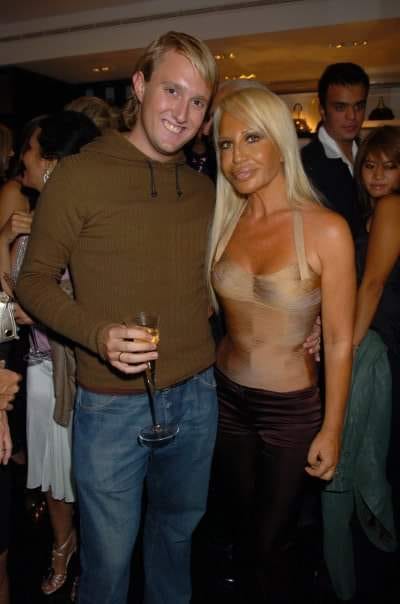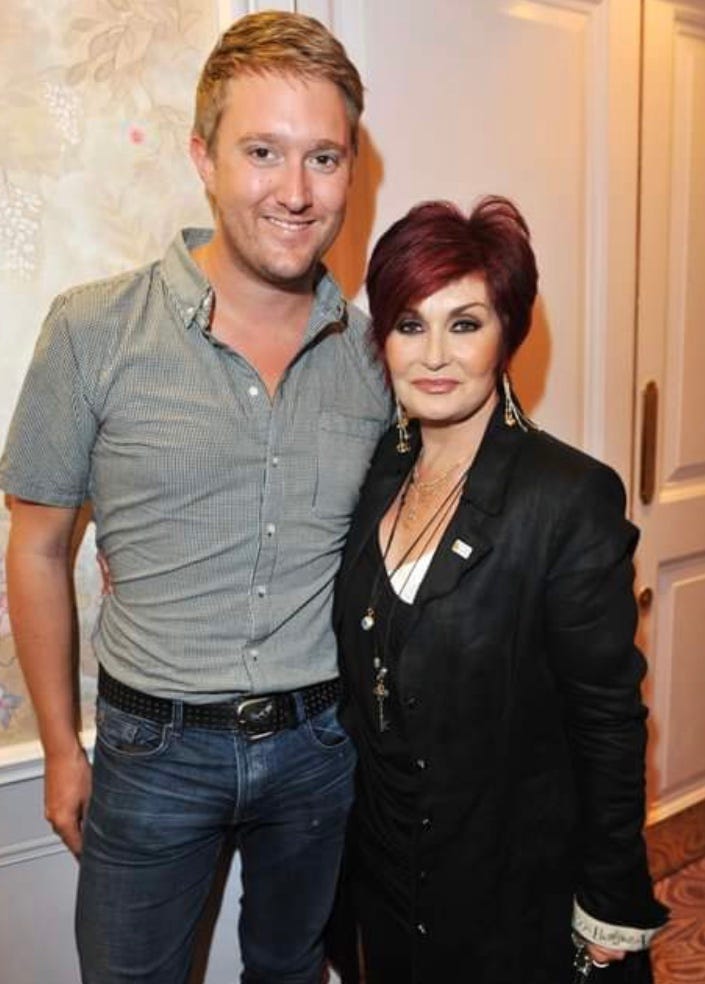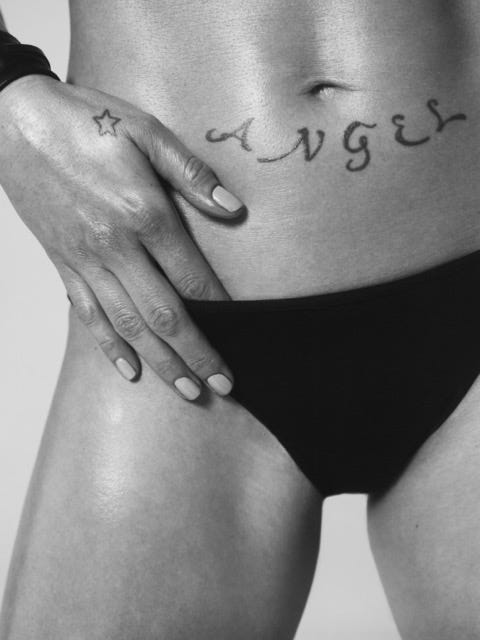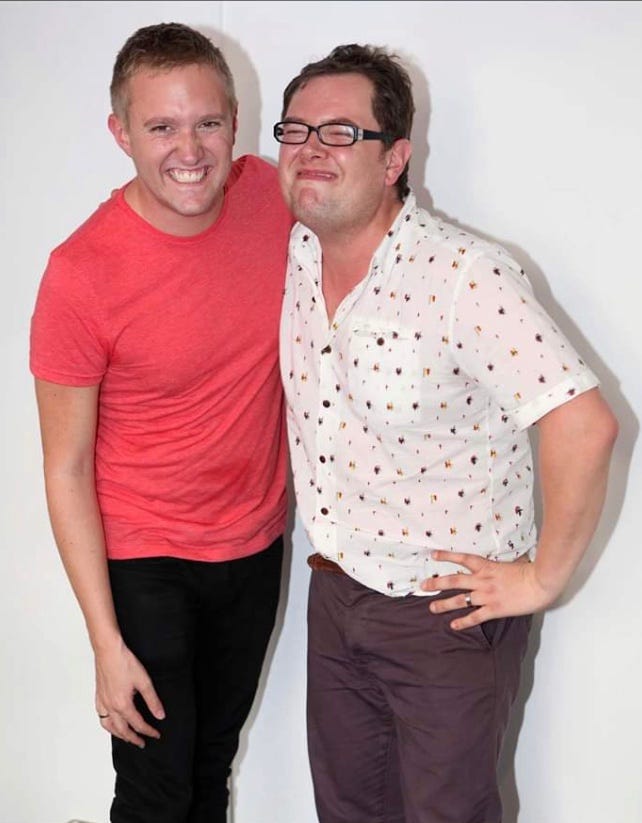A journalist’s guide to not being a prick PR…
I know how to get the most from a journalist – because I was one! I also know how to make sure you’re getting the job done as a PR...as nowadays I am one. So here's what I've learnt.
Willkomen! Bienvenue! Welcome!
This is a special edition of my WTF Wednesday newsletter. Truth be told, I’m at home with Covid for the second time which is very boring indeed. I got it during the launch of Boujis 2.0 (B London) which I was running last week. It was a very fun night indeed. But I’m definitely licking my wounds here at home watching a lot of television and sleeping. I’m calling my sickness the Boujis Flujis, obviously.
Firstly, I was so chuffed to have over 2,000 reads of last week’s newsletter – it’s great to see so many of you reaching out and mentioning you’re enjoying the writing. Please do share on social media if you like what I’m doing – it really helps people to know I’m here doing something…and writing again.
Anyway, Covy-D and gloating aside, this newsletter is coming to you in the hope it guides you a little to becoming a good PR. Whether it be personal, brand or local PR – you need to know how to get the most from the job. If you’re young and fresh to this world…or if you’re a little more experienced but need to regroup - this is the list for you. It might even make sense for some of you old timers too ;-)
It's a Bible-esque list to try and help everybody get along a little better in this funny world of PR.
Soooo here goes…
1. First up - know your genre! If you’re in sport – know all the journalists in that sphere. If you’re in entertainment make a database of the journos currently in positions. If you’re in news or politics – know who to go too. Hospitality – know your foodies and editors. Research is pivotal. Doesn’t matter how old you are – keep on top of changes to your list at all times. The amount of youngsters that haven’t got a fucking clue who their top journalist names are is literally beyond me.
2. With your sell in, don’t go for the legendary journalists and editors to start – grab the assistants and the junior reporters first. They’re HUNGRY for it – like you are. They want to impress and have the vital energy to properly sell in your pitch to the elder editors ad section heads. The old hacks are pretty pointless – they’re all miserable and bored of life in journalism.
The top people in journalism are too busy, stuck in dullard meetings about how to make more money for the brand and tbf couldn’t give a rats ass about your press release.
3. Don’t do an ‘all-round’ press release. It’s fucking pointless. A journalist gets HUNDREDS of releases a day. If it doesn’t have their name on the top and a personal touch they simply delete. I’m still on mailing lists for all the music and film PR folk now…after ten years of leaving papers. I receive their drivel all the time and delete. It’s embarrassing how many pointless emails these PR folk send out. It’s also exceedingly lazy PR to just send a release to a database of 1000 people and expect press to simply appear. Those days are LONG GONE. Right now the targeted approach is the way forward. OBVS unless it’s a huge breaking news story with a comment/death or company closure. Then send it to every fucker and don’t care how far the reach is.
4. Ensure a press release is well written, ideally on a single page with all the main information. SURE, if you want to do reems of ‘editor’s notes’ then go for it. But you have the journalist for a page MAX. So don’t write the bible. You’re wasting time. Generally a journalist will come back to you with questions if and when they’re going to run something. They will totally ignore editor’s notes and almost always only ask specific questions they require the answer for…
5. Ensure you have the website address and ALL relevant social media handles and hashtags prominently displayed. Screw the longwinded editor’s notes…
The social media handles are crucial – and as we know…in some ways even more important for the bigger picture for PR in 2023.
6. Include ONE picture on a release to clearly illustrate your product or the point of the release. DO NOT include anything over 3mb. It will slow the journalist’s computer down and piss them off. If they need high resolution imagery they will ask for it.
7. Clearly state what the release is in the Subject box. If I’m inviting somebody to an event is reads “INVITE:”. If it’s a release “PRESS RELEASE/ANNOUNCEMENT”. But keep it to 7 words max. Don’t put an essay in the subject box. Journalists are there to cut out the bumpf and if they see your release or the subject box and that it’s overwritten and shite they will be pissed off from the get go. Again.
8. Research your journalists on social media. In my day (back when I started in 2000 at the Mirror) we knew very little about our PR friends. And they knew very little about us. We actually had to meet each other and talk to find out what our interests were. These days you have excellent spying techniques and opportunities to know who you’re dealing with and what they have a genuine interest in. So play the sleuth. You’ll find out the Mail journo has a penchant for cooking Asian food. So that chef you have would be ideal for them. Or that guy at the Mirror loves cross dressing so a drag show to PR would be ideal. Lolz. I gest. But you hear me – get spying to get to know who you’re pitching too. There are zero excuses for not knowing your journalists right now.
9. Try and meet at least two journalists a month. For breakfast, tea or coffee. But do this – know their schedule. If they’re on a Sunday paper they don’t work Monday etc. It’s all very easy stuff.
If you work in hospitality you have ZERO excuse – use your venues to get to know writers and show off your client. Look, I know if you’re in your twenties the idea of actually meeting somebody face to face might be alarming but it remains the best and easiest way to solidify a working relationship, get better stories placed in publications and WHO KNOWS you might even have fun too.
10. Reply to your fucking emails. This applies to journalists as well as PR folk.
Emails are important. I know people think it’s cool to let things sit but in reality it really isn’t. If you’re a journo not replying to a PR they get irate and annoyed as they might have come to you first. If it’s a no just say it’s a no.
And let’s face it, PR has never been harder – mainly because journalists are so pressed for time right now they expect the feature practically written and delivered to them to run in a paper or magazine…and definitely for online.
So, when there’s a question – reply. Always. There’s no time off in the world of PR right now. And journalism is a 24/7 job. Always has been. If a journalist has reached out to you then they’re intrigued. You’ve perfectly dangled that big juicy carrot above the donkey’s head. Now, he needs to munch it.
You might miss that piece of coverage if you go “ahhhh, it's gone 4pm on a Friday – I’ve started the weekend already.” No, dick. REPLY. It might be your only chance with them and achieving a piece of golden press.
11. Encourage your clients to write features ahead of a campaign. If you have, let’s say, an influencer or somebody within a lifestyle genre with a great social following…encourage them to write.
If they have a feature or two in them then help them write it – or even look to get a freelance journalist to ghost it with your client if you can’t write. After all, there are a gazillion freelancers out there desperate for paid work with so many titles closing.
I wrote a piece with Spice Girl Melanie C about fame when we began working on some album PR for Version of Me. I sold the idea in to Katie Grand (at LOVE at the time) who then commissioned a mega shoot and it gained GLOBAL coverage. You MUST have ideas to be a good PR right now. And if you can write or get your client to write it’s a great start to opening doors.
Please see below for some MEGA images we created with LOVE’s Thurstan Redding…
12. Hit the town and meet people. Go to the screenings. Go to the restaurant launches. Go to the premieres. Go to the festivals. Just get your ass out there and GO MEET PEOPLE. Once you’re in journalism or PR (especially in a specific genre) you quickly realise there are a small amount of people to know. Contacts are key. You’re not going to get anywhere in either journalism or PR if you sit at your desk typing and enjoying ‘office life’.
BTW - same goes for you PR company bosses and news editors out there that think chaining your staff to the desk 24/7 is going to work for productivity. It’s not. Get the youngsters OUT THERE as much as possible. They need to shake a tail feather to meet contacts at the start of their career. Sure, keep a watchful eye on them to ensure they’re delivering but getting people out into the world is vital.
13. Do not try and call a journalist you’ve never spoken to before. It’s pointless. I get annoyed if somebody calls me out of the blue and tries to act all nicey nicey. Even worse if they use mannerisms like “Hi Darling”. I’m not your fucking Darling. I don’t know you. My name is Dean. Don’t be acting too familiar until you know me.
You might follow me on social and feel you know me but don’t be calling me Darling, thanks.
Start on email, ideally meet them for a coffee or at an event and work that contact to the point where you’re able to speak to them on what’s app. But phone calls are really a grey area. If I’ve learnt one thing. If a journalist is keen on your release/story/pitch they will reply. Eventually. If they don’t then MOVE ON.
14. Let’s talk follow ups. You sent the release or email. But no reply. How many follow ups and when do you move on?
Right, firstly send the email on a Monday (FYI – fucking pointless sending out a release for anything new on a Friday) – you’re good to check in and see if they received your email from Monday…on the Friday.
Then if there’s no reply whatsoever by the middle of the next week….NEXT.
I sometimes might send a final email midweek and just say “I was coming to you firstly on this – but as I haven’t heard from you I’m assuming I can move on”. That will usually jog a quick apology but at least you know you can get going on the Plan B.
15. Keep strict contacts lists. These days (as I mentioned last week) you might want to have an excel spreadsheet with separate subject boxes for journalists, editors, celebrities, influencers etc. But have a list of contacts in one place (and backed up on a Passport disk or something similar) so you have your contacts safe and sound. That’s your future for whatever you decide to do. Thanks what makes you bankable as a PR (or journalist).
16. Something I learnt REALLY early on in my days at the Mirror and 3am.
If you’re going to bad mouth somebody in journalism or within the entertainment industry be prepared for that person to find out. It ALWAYS finds its way back to the source. People in PR and journalism LIVE for gossip. They’re all big-gobbed twats (including me at times). So if you say it, be prepared for a month or so later when that person hears you call them a C-U-NEXT-Tuesday. I know from experience.
Finally, if you’re going to have to lie about a situation as a PR then make it believable. Especially in showbiz. You need a watertight lie if you’re going to get past the inquisitive nose of a tabloid journo working in celebrity gossip. Same goes for politics. Just keep in mind, like the above…things have a tendency of leaking out. And if a little white lie you told a top journo gets unearthed then you’re in big shit. The paper will likely shit on your clients, they’ll bad mouth your event and tbf act rather childish. It’s almost better to try and tell as much of the truth as humanly possible. Or face the consequences.
P.S. Sorry for the swearing. I swear when I’m enthusiastic and excitable. Farrrrrrrk, sorry MUM.










